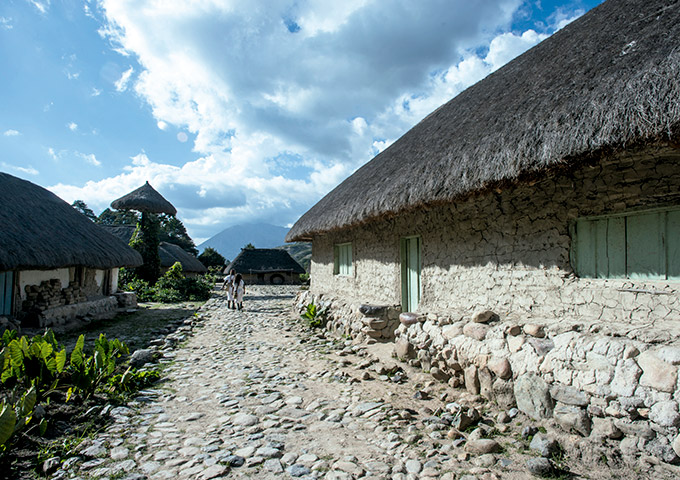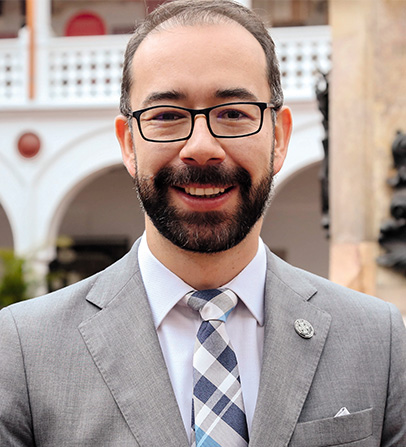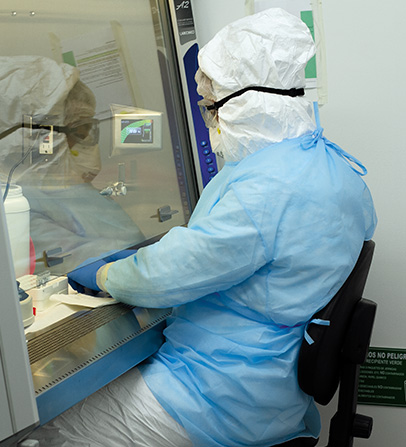More high impact science
By: Mara Brugés Polo
Photos:
Science and Tech

By: Mara Brugés Polo
Photos:
In soccer or cycling teams, the strength of each one of the athletes depends not only on their individual performance but also on the opportunity for collaborative work and the motivation that the “Esprit de corps” gives them toward the achievement of collective results. In such a sense, Sergio Andrés Pulgarín Molina, vice-president and provost of Universidad del Rosario, says that strength is not found exclusively in the skills of the athlete but mainly in the team as a whole On a different scale and in a different context, the same happens in the field of research, explains the executive, who strongly believes that the unit of analysis, intervention, and incentive is not the researcher as an isolated actor, reduced to their individual concerns about the world, but rather the research group as a collective way of formulating ideas that materialize thanks to the collaborative work of a network system. ThIn soccer or cycling teams, the strength of each one of the athletes depends not only on their individual performance but also on the opportunity for collaborative work and the motivation that the “Esprit de corps” gives them toward the achievement of collective results. In such a sense, Sergio Andrés Pulgarín Molina, vice-president and provost of Universidad del Rosario, says that strength is not found exclusively in the skills of the athlete but mainly in the team as a whole
On a different scale and in a different context, the same happens in the field of research, explains the executive, who strongly believes that the unit of analysis, intervention, and incentive is not the researcher as an isolated actor, reduced to their individual concerns about the world, but rather the research group as a collective way of formulating ideas that materialize thanks to the collaborative work of a network system. This vision is tightly related to what in the world of science is known as human-centered research or research centered on the individual. This concept adopts, more than a method or a tool arrangement, a way of reflecting on science from a humanistic perspective, rather than doing so on an individual one. As a practical dimension, it means exploring, understanding, and solving research problems from the perspective of the real needs of humanity. How is this achieved? Favoring processes associated with inquiries, collective learning, feedback, collaboration, and perhaps the most important, understanding of human beings and their environment.
“Thinking about science from the individual’s centricity point of view means to think mainly about how the act of research implies a transforming impact for humanity”, dsays the vice-president and provost, to whom all the research projects, whether basic, applied, or innovative science, are likely to have a high impact on the society. “We must not mistake the purposes of basic and applied science or enter that fake dilemma of which one is more important. Both are fundamental, from pure utilitarianism to simple motivation, to explore and understand any phenomena. High-impact research does not conflict with any particular manner of understanding scienc”, affirms.is vision is tightly related to what in the world of science is known as human-centered research or research centered on the individual. This concept adopts, more than a method or a tool arrangement, a way of reflecting on science from a humanistic perspective, rather than doing so on an individual one. As a practical dimension, it means exploring, understanding, and solving research problems from the perspective of the real needs of humanity. How is this achieved? Favoring processes associated with inquiries, collective learning, feedback, collaboration, and perhaps the most important, understanding of human beings and their environment. “Thinking about science from the individual’s centricity point of view means to think mainly about how the act of research implies a transforming impact for humanity”, dsays the vice-president and provost, to whom all the research projects, whether basic, applied, or innovative science, are likely to have a high impact on the society. “We must not mistake the purposes of basic and applied science or enter that fake dilemma of which one is more important. Both are fundamental, from pure utilitarianism to simple motivation, to explore and understand any phenomena. High-impact research does not conflict with any particular manner of understanding scienc”, affirms.

“We must not mistake the purpose of basic and applied science nor enter that fake dilemma about which is more important. Both are fundamental,from pure utilitarianism to simple motivation, in order to explore and understand any phenomena. High-impact research does not conflict with any particular manner of understanding science,”, affirms Sergio Andrés Pulgarín Molina, vice-president and provost of Universidad del Rosario.
Pulgarín, who graduated in management from his undergraduate studies to his doctorate. His interest in the management field (direction and management of organizations) took him to question the challenges of research in this field. This interest was generated because of the gaps among organizations’ understanding and intervention needs and research interests of an important number of scientists in the field.“It was on this that I understood that the research of impact and individual’s centricity are closely related to the solutions delivered to society.””.
From his reflections of the management’s perspective, the vice-president and provost adopted the notion of the individual’s centricity and influence research and has since stood out for putting into practice these concepts in the different university leadership environments: ““I strongly believe in collaborative construction as an efficient mechanism to guide and make assertive decisions. Recently, when we worked on the Ruta UR 2025 (Route UR2025) Digital Revolution, the first thing we did was to ask 9,600 community actors about the future of the university. This initiative took us 5 more months of work than what it would have taken us if we had agreed upon before with university leaders; however, given the fact that the Universidad del Rosario has a culture based on reflection and dialog, we took the longer path, the one with greater impact and participation. This has to do with the vision I want to leave behind as an enduring legacy of my administration as a vice-president and provost”, he assures.
Maturing the research
Universidad del Rosario started a research-maturation process over 20 years ago; however, in the past 5 years, it has been remarkably strengthened in terms of range in different knowledge fields, better quality, internationalization, and scientific collaboration networks. Today, it is possible to introduce a reconstructive and understanding science to the country, wherein the generation of knowledge toward service for the public’s well-being must go on.
Armed with the vision acquired by his studying at Universidad del Rosario, by his experience as a professor, and by his participation in scientific activities, the new vice-president and provost of Universidad del Rosario arrives with the firm purpose of continuing the consolidation of a culture of research wherein human beings are the backbone of scientific reflection and at the same time a great beneficiary.
“Further investigation on the problems that prevent the world from being a better place needs to be done. At the university, we have many examples: The Alliance of Formal and Inclusive Economy (EFI in Spanish), funded by the governmental initiative Scientific Colombia and established by 24 national and international actors, to develop the Scientific program of social and productive inclusion: Programs and policies for the promotion of a formal economy. This is one of them, where we achieved to create a research ecosystem that addresses different areas of the same high-impact problem, such as informality in employment and its implications in an emerging economy such as Colombia. This has an impact that transcends the development of the country and benefits many persons working in informal systems. This is the type of science that I am referring to ”, explains Pulgarín.
To be more emphatic, he quotes another example:“The university does multiple projects and research initiatives through the Intercultural School of Indigenous Diplomacy (Eidi in Spanish), the main spirit of which is to give follow-up to women from the Resguardo Arhuaco del Cesar in training processes and to their organizations in processes of collaborative research. In the past decade, approximately 5,000 indigenous people have been trained in all of the country, and recently, the researchers published a report about the memoirs of the Arhuacas women, called ‘Voices of Mother Earth,’ which contributes to the explanation of the truth and the construction of peace.¿ Does this have any impact?¡ Of course, it does! Because it contributes to solving real problems of humanity through research, and we must focus on that”,assures Pulgarín.
With the implementation of such projects, transversal and multidisciplinarian, Universidad del Rosario consolidates itsresearch groups and generates new training processes through scientific activities wherein the mature researcher, who has solid experience, shares his knowledge and challenges with enthusiastic youngsters barely starting out in the field of research through incubator programs, young researchers, and graduated assistants, among other options that motivate scientific talent and generational replacement.
hus, Sergio Pulgarín, someone who believes that implementing the scientific method is useful for many things in life, not just science, starts outlining the institution’s new plans of research that are based on strategy rather than structure. “The key lies in understanding before intervening and always generating a high impact on society”, he concludes.

With the implementation of transversal and multidisciplinary projects, Universidad del Rosario consolidates its research groups and generates new training processes through scientific activities wherein the mature researcher, who has solid experience, shares his knowledge and challenges with enthusiastic youngsters, who are barely starting out in the field of research through incubator programs, young researchers,and graduated assistants,among other options that motivate scientific talent and generational replacement.